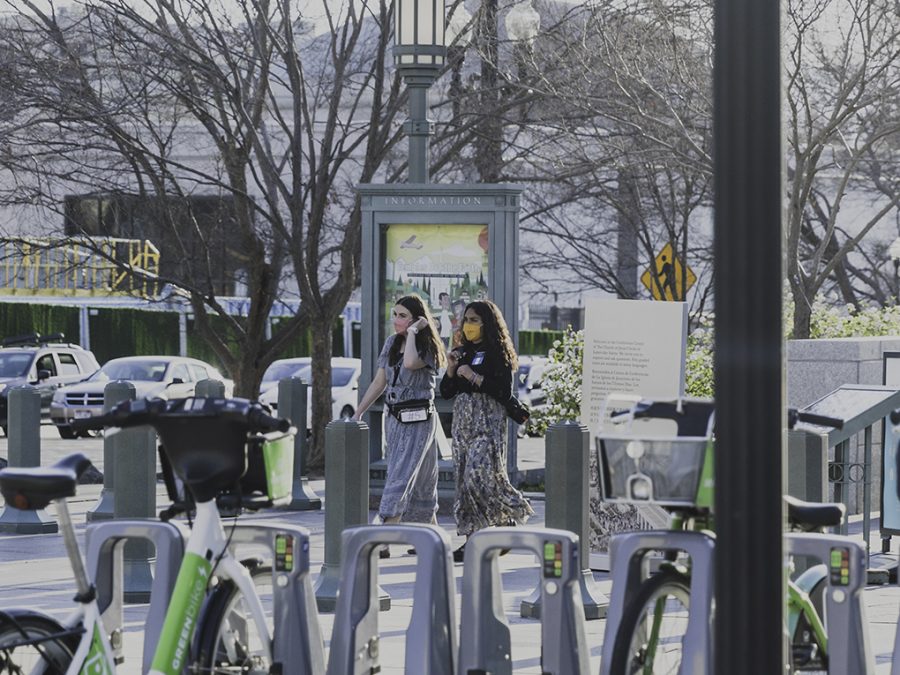Kincart: Vaccinate the Missionaries
A pair of LDS missionaries. (Photo by Silvana Peterson | Daily Utah Chronicle)
April 13, 2021
In mid-January, photos of President Russel M. Nelson getting his first dose of the COVID-19 vaccination circulated the internet. This was followed by a statement from The Church of Jesus Christ of Latter-Day Saints urging members to get vaccinated. The Church actually handled COVID-19 well. They canceled services, closed temples, and made conferences remote. There was a clear acknowledgment of the severity of the pandemic. As restrictions are lifted, congregations may meet in person while following local regulations. In my experience, congregations avoid spread through wearing masks and abstaining from singing hymns.
Despite the pandemic, missionary work persisted. Although some missionaries were sent home, many have been reassigned. Missionaries are now relying on technology to spread their message. The church recognizes that the continuation of missionary work puts missionaries at risk of infection. Yet, the Church is not requiring missionaries to get their COVID-19 vaccination. The Church should require missionaries to receive the COVID-19 vaccine. Vaccinations act in harmony with the Church’s beliefs and precedents for missionary work.
Love One Another
A common scripture referenced in the Church says to “love one another.” Is there a better way to do that than get vaccinated? Around 80–90 percent of the population needs to be immune in order for us to gain herd immunity from COVID-19. If more people are vaccinated, the disease is less likely to spread, thus protecting those who are unable to be vaccinated.
Also, it is important to note that missionaries seldom maintain a tight social sphere. They are constantly moving between teaching new people and interacting with various members of the ward. Anson Bennett, a physics major at the U and returned missionary, explained that missionaries spend a lot of time around other missionaries — not just their companions. He said that sometimes there are “upwards of 25 people in a room during zone conferences.” So there’s a lot of potential for spread. Not only does the vaccine reduce the severity of the illness, but it potentially reduces the ability to spread the virus. Missionaries should prioritize the safety and health of the communities they are actively involved in by receiving the COVID-19 vaccine.
Lead by Example
Another common concept expressed in the Church is to “lead by example.” Missionaries should be modeling healthy behavior for other members to follow — especially in regard to vaccinations. I grew up singing the Primary song, “I Hope They Call Me on a Mission.” The lyrics of this song express a childhood admiration for missionaries and desire to follow their example. Sydney Slade, a former missionary in Fort Lauderdale, spoke to the importance of being an example for others. “As a missionary, people watch everything you do because you’re there to help them,” Slade said. “The little things really matter.” 14% of Utahns don’t intend to get vaccinated — with reasons varying from not trusting vaccines, not finding them necessary, and fears of side effects. With all the misinformation and opposition to vaccines, it is crucial that missionaries lead by example and get the COVID-19 vaccine. This simple action could change members’ perceptions of vaccines. Also, General Authorities in the Church already received their vaccines. They led by example and it is time for missionaries to follow suit.
Protecting Health and Preserving Life
Updates to the Church’s General Handbook were made in late March, saying that, “Vaccinations administered by competent medical professionals protect health and preserve life.” This addition is supported by a precedent of vaccinations and missionary work. Missionaries are given different immunization requirements dependent on where they will serve. Bennett, who served in the South Africa, Durban mission, said that his mission had a few vaccine requirements. He already had most of what was required but just needed to make sure some of them were up to date. There’s already an expectation to receive certain vaccines, so why should the COVID-19 vaccine be any different?
The Church has a set Body Mass Index cutoff for missionary eligibility, although BMI is proven to be a poor measurement of health. They have also limited missionary service for people recovering from eating disorders or with learning disorders. It’s absurd that requirements like this exist, but a vaccine requirement doesn’t. Since the COVID-19 vaccines are proven to be effective, there is little harm in making it a requirement for service.
As vaccine eligibility continues to expand, more missionaries are able to receive the COVID-19 vaccines. Everyone 16 and older in Utah is now eligible to receive the vaccine. Missionaries should do their part in preventing spread and infection by receiving the COVID-19 vaccine. Because of precedent and religious alignment, the Church should require all current and future missionaries to be vaccinated against COVID-19. Widespread vaccination needs to occur before missionary work can return to normal. After all, returning to normal is something that can’t come soon enough.









